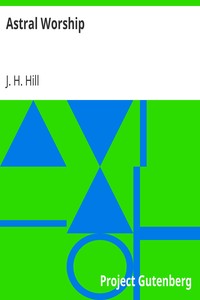| Summary |
"Astral Worship" by J. H. Hill, M.D. is a philosophical examination of ancient beliefs and their impact on modern religions, likely written in the late 19th century. The work contends that much of what is accepted in contemporary Christianity can be traced back to earlier forms of astral worship, notably the worship of imaginary deities associated with celestial bodies, particularly the sun. Hill proposes that ancient religious systems, which included elements such as astrology and solar deities, served as precursors and foundational constructs for modern religious dogmas. The opening of "Astral Worship" introduces the reader to the author's foundational thesis, asserting that the roots of religion are deeply intertwined with astronomical phenomena and mythological narratives. Hill references the Magi, or wise men, of ancient societies who crafted a geocentric view of the universe and established doctrines based on their interpretations of celestial events. He argues that early religious practices were largely derived from allegorical astronomy rather than divine revelation, illustrating how the ancients personified celestial phenomena into deities that played significant roles in their religious narratives. Hill's critical perspective sets the stage for a comprehensive analysis of the evolution of religious beliefs, suggesting that the transformations witnessed over centuries were fundamentally tied to the same astrological symbols and ideas that governed humanity's understanding of the cosmos. (This is an automatically generated summary.)
|

